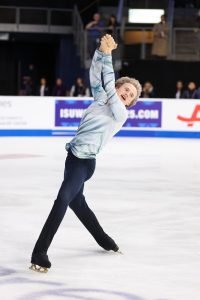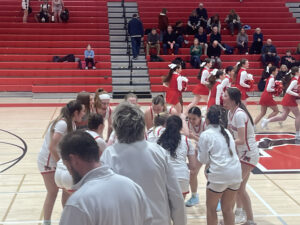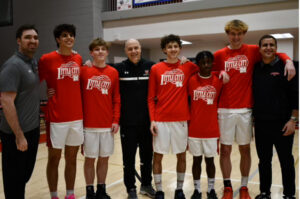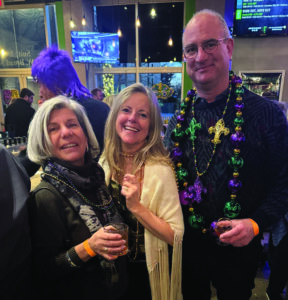3 Major F.C. Civic Groups Hold Town Halls on Key Issue
The battle lines are drawn, and emotions continue to run high among community activists in the City of Falls Church, as the Nov. 8 election day approaches when City residents will vote on whether to keep the City’s municipal election in May of even years, or shift them to November of odd years.

3 Major F.C. Civic Groups Hold Town Halls on Key Issue
The battle lines are drawn, and emotions continue to run high among community activists in the City of Falls Church, as the Nov. 8 election day approaches when City residents will vote on whether to keep the City’s municipal election in May of even years, or shift them to November of odd years.
Three of the City’s most prominent local civic groups – the F.C. chapter of the League of Women Voters (LWV), the Citizens for a Better City (CBC) and the Village Preservation and Improvement Society (VPIS) – combined to sponsor two town hall meetings in the past week in an attempt to shed more light than heat on the issue.
The LWV educational forum was held last Thursday at the Community Center, attended by about 50 people. The CBC and VPIS co-hosted a follow-on forum in the library of George Mason High School Tuesday night which drew about 30. As a side note, it was an historic collaboration by the CBC and VPIS, the first time in memory that the groups, both around since the 1970s, have worked together on an event of this kind.
But while that collaboration might have signaled a new consensus in Falls Church, that did not translate into warm and fuzzy feelings on the subject of the Nov. 8 referendum. There continues to be a sharp divergence of views and little lack of strong opinions on the matter among the City’s core civic activists.
The role of the activists on both sides of this issue will be particular decisive in this election because of the expected low turnout. Besides the referendum, the only other items on the ballot will be three overwhelmingly lopsided races, two for the state legislature (incumbents State Sen. Dick Saslaw and Del. Jim Scott are expected to win by landslides) and one for the Arlington Commonwealth Attorney, where Theo Stamos is running unopposed.
The competing opinions on the referendum boil down to keeping elections in May because, essentially, “if it ain’t broke, don’t fix it,” and to moving them to November because of a guaranteed higher voter turnout.
A fact sheet on election turnouts in Falls Church the last 20 years handed out at Tuesday’s meeting was conclusive: November elections draw almost twice as many voters, on average, as May elections do.
Concerns for polluting non-partisan local elections with partisan influences were loudly expressed at Tuesday’s meeting. F.C. Mayor Nader Baroukh questioned the effect of a volunteer who would campaign for a non-partisan City Council or School Board candidate during the same election process when he or she might also campaign for a partisan in a state election on the same ballot.
However, everyone seemed to agree that the local elections should remain non-partisan, both to enable federal employees to seek office (and not violate the Hatch Act), and to keep the elections focused on local issues.
The chairs of the Falls Church Democratic and Republican committees were both invited to Tuesday’s meeting, but only the Dem Commitee’s Betty Coll showed up.
She became a focus of intense interest as she said her committee had no desire, whatsoever, to take partisan sides in a Falls Church local election. She committee is on record favoring a move of City elections to November, and the GOP committee has come out in favor of keeping the elections in May.
“I wish my Republican counterpart were here tonight,” Coll said. “I’d like people to hear assurances from his group, as well, about staying clear of partisanship in our local elections.”
At last week’s LWV meeting, State Sen. Saslaw spoke briefly at the opening of the event urged passage of the referendum to move local City elections from May to November. Saslaw, a veteran Senate Majority Leader, is on the Nov. 8 Falls Church ballot for the first time since being redistricted into the City in the spring, He said, “It’s hard to see how democracy loses with more people voting.”
However, Saslaw’s was virtually the only statement from the podium that took sides on the measure in that forum, unlike the strong opinions expressed in Tuesday’s meeting.
Ellen Salsbury of the LWV made it clear at the outset that her organization has not taken sides and that the event was not set up to be a debate or a public hearing, but just to share information.
With 50 people present, a panel including Martha Brusette of the State Board of Elections, Renee Andrews, secretary of the F.C. Electoral Board, and Ryan Polk, vice-mayor of Manassas Park made comments and took written questions from the moderator, Edie Snyder.
Polk was invited because his jurisdiction, an independent city roughly the same size as Falls Church, moved its elections from May to November in 2008. He said he “championed” the move and added, “I don’t regret changing it,” noting significantly higher voter turnouts as a result. However, he also expressed misgivings about the decision to have November elections held in even, rather than odd, numbered years, and said if he had it to do over, he would not have supported that.
But it was noted that the Falls Church referendum, if passed next month, would place its November elections in odd-numbered years when they would not share the ballot with any federal, but only state, races.
Factors inclining in favor of the move from May to November presented included a history of an average doubled voter turnout size, cost savings (each election runs at a cost of $18,000 to the city) and the better use of limited election manpower resources. As election officials are tasked with working the polls in each election from 5 a.m. to 8 p.m. and when there are usually primaries following a May election, officials and volunteers wind up having to put in those kinds of hours twice in a five week period.
Andrews said the argument that a longer November ballot increases the likelihood of confusing voters can be offset by one saying that having separate May and November elections confuses voters even more.
“With the high educational level of Falls Church citizens,” she noted, “It can be expected that they can understand the issues no matter what.” She also pointed out that Falls Church often has the highest voter turnout of any independent city in Virginia, including in November 2008 when it was 82 percent of elected voters.
She also cited the data from Manassas Park indicating that long ballots only marginally deterred voters from marking choices near the bottom for local races. Even though there were fewer votes than for those at the top of the ballot, she noted, the total votes cast for local races remained significantly higher than when that city’s elections were in May.
In addition to Saslaw, one other candidate on the November 8 ballot was present to extend greetings tonight, Theo Stamos running for Commonwealth Attorney. All candidates on the ballot in Falls Church had been invited. Members of the F.C. City Council present in the audience included Mayor Baroukh, Vice Mayor David Snyder, and Council members Ira Kaylin, Johannah Barry and Lawrence Webb.
Mayor Baroukh, Snyder and Webb were also present at Tuesday’s meeting. Former mayor Brian O’Connor and former vice mayors Hal Lippman and Lindy Hockenberry spoke in favor of the move to November, and venerable City activists Lou Olom, a co-founder of the CBC, and Ed Strait, a former City Councilman, both spoke in favor of keeping the elections in May.
On the other hand, “I want as many people as I can to tell me if I am doing a good job or not,” Revenue Commissioner Tom Clinton said, favoring the move to November. “The issue of turnout is very clear,” added O’Connor, also favoring a “Yes” vote on the referendum to move elections to November.
The CBC’s Sally Ekfelt and VPIS’s Mike Volpe moderated Tuesday’s meeting, and former Councilman Dan Maller provided a lot of information from state and local statutes.














